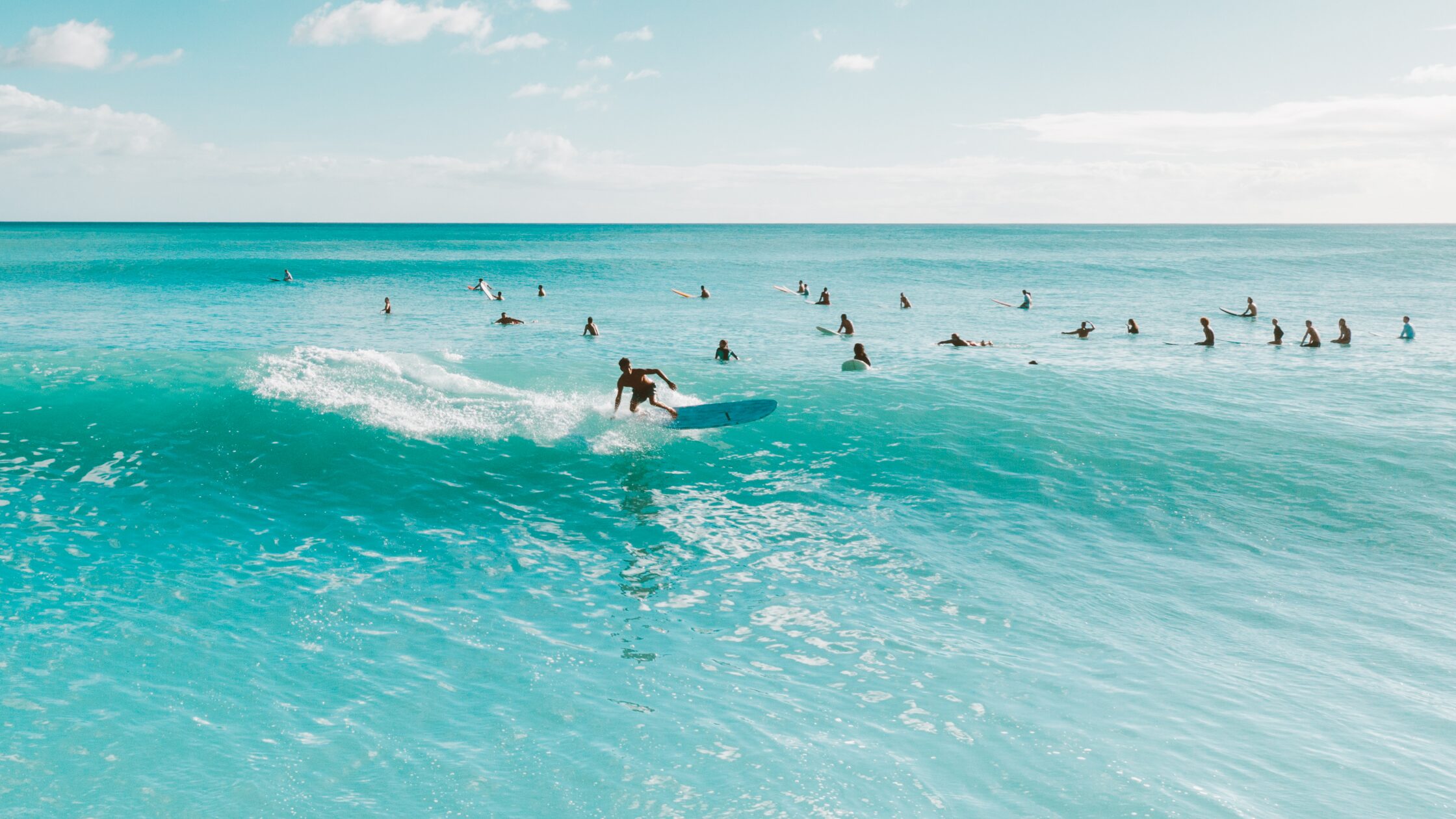Your packing list can make or break your Fiji experience, so we’ve gone ahead and prepared one for you. With activities ranging from sun-soaked relaxation on pristine beaches to adventurous treks through tropical terrain, your luggage should be an ensemble of comfort, function, and respect for local customs.
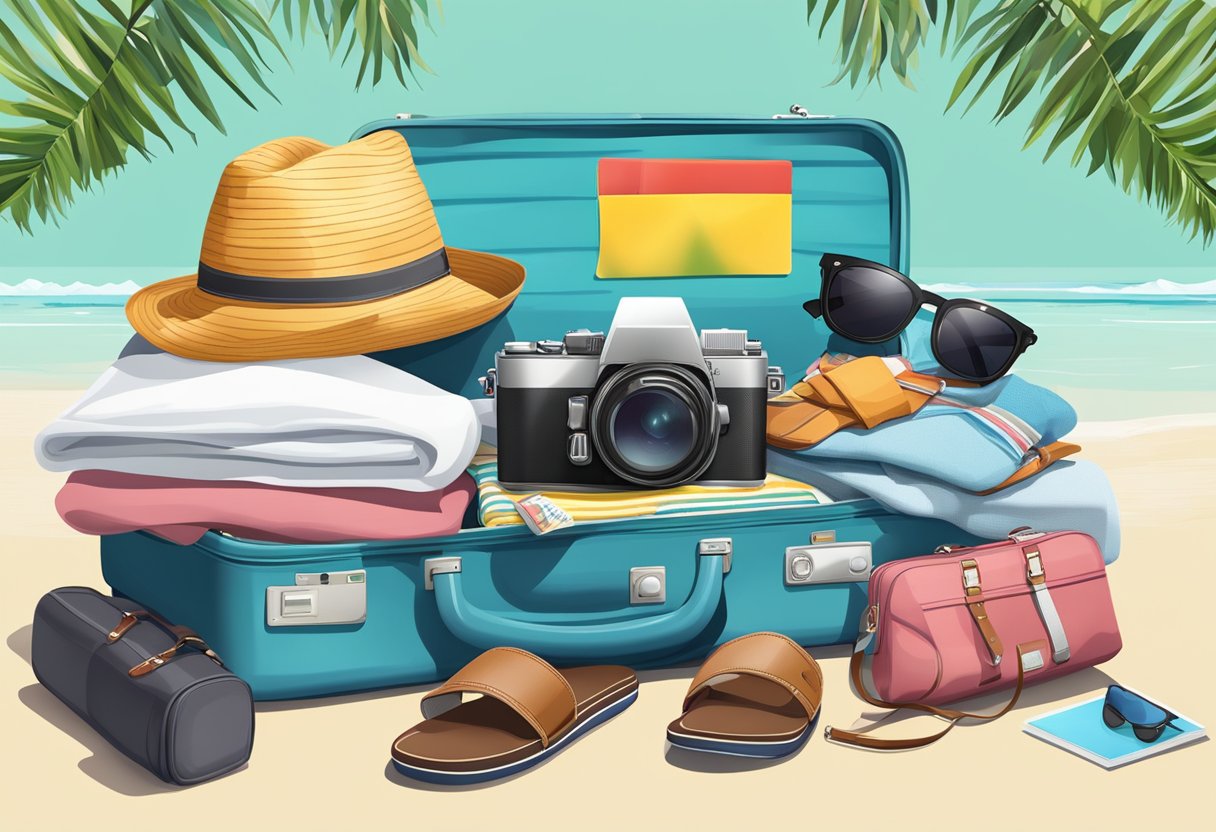
Understanding Fiji’s tropical climate and dynamic weather patterns is critical for selecting the right clothing and accessories. You’ll need a balance of lightweight, breathable attire for the daytime heat and layering options for cooler evenings. Since plans often include a mix of relaxation and exploration, your packing list should encompass gear for both leisure and adventure. Whether it’s lounging by the sea or engaging in water sports, ensure you have the essentials to enjoy each moment fully, while also considering the items that protect your health and well-being in a new environment.
Key Things You Need to Think About
- A comprehensive packing list enhances your Fiji travel experience by addressing all activities and local customs.
- Clothing and gear should cater to the tropical climate, water activities, and varied terrain.
- Prioritise essentials for health, safety, and convenience, including travel documents and personal items.
Essential Travel Documents and Money
Before setting foot on the islands of Fiji, you’ll need to have all necessary travel documents and an understanding the currency and payment options available to you.
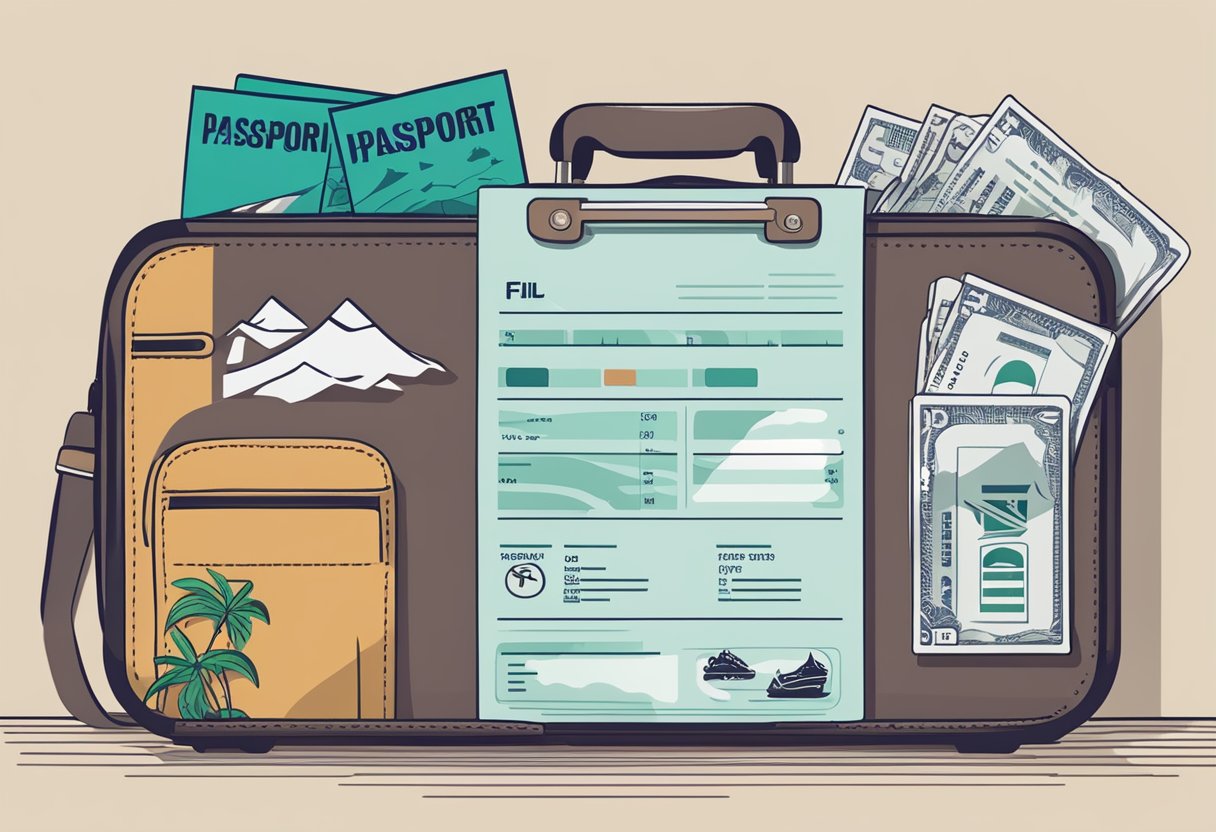
Identification and Travel Documents
To travel to Fiji, your passport must be valid for at least six months beyond your planned date of departure. When packing, make sure your passport and any necessary visas are readily accessible. Fiji may require visitors to obtain a visa depending on the length of stay and nationality; it’s crucial to check the latest requirements well before departure.
For convenience and security, organise your travel documents in one place, including flight bookings, accommodation bookings, travel insurance details, and any required health documents. It’s advisable to keep electronic copies of these documents stored securely online as well as physical copies on your person.
Currency and Payment Methods
Fiji’s currency is the Fijian Dollar (FJD). It’s wise to have a small amount of cash on hand upon arrival for incidentals or establishments that may not accept cards. Major hotels and restaurants typically accept credit cards, but it’s important to inform your bank of your travel plans to avoid any issues with international transactions.
In addition to your primary credit card, carrying a backup card is recommended in case of loss or theft. ATMs are widely available in cities and tourist areas, but less so in remote locations, so plan your cash withdrawals accordingly. Always remember to practise normal safety precautions when carrying cash and using ATMs.
Luggage and Organisational Items

For a successful trip to Fiji, the key to efficiency lies in selecting the right type of luggage and using organisational accessories to keep your belongings tidy and easily retrievable.
Choosing the Right Suitcase
When it comes to picking a suitcase, your choice should hinge on the duration of your stay and the activities planned. If you’re planning for a week or more, a hard-shell, wheeled suitcase provides durability and ease of transport on uneven surfaces. For shorter stays or island-hopping, consider a lightweight carry-on that meets airline regulations, ensuring you keep essentials like a charger or waterproof phone case for your electronics within arm’s reach.
Organisational Accessories
To keep your suitcase contents organised and your important items like travel documents and a pen for customs forms secure, invest in packing cubes and organisational pouches. A travel wallet is ideal for keeping your passport, travel insurance details, and boarding passes tidy. Remember to bring a book or magazine for personal entertainment during downtimes but store them in an easily accessible spot. Keep your electronics in a separate, cushioned compartment to protect them from damage, and ensure all your items, especially those you own and wish to keep clean, are stored in appropriate, clean receptacles.
Clothing and Footwear for Fiji’s Climate
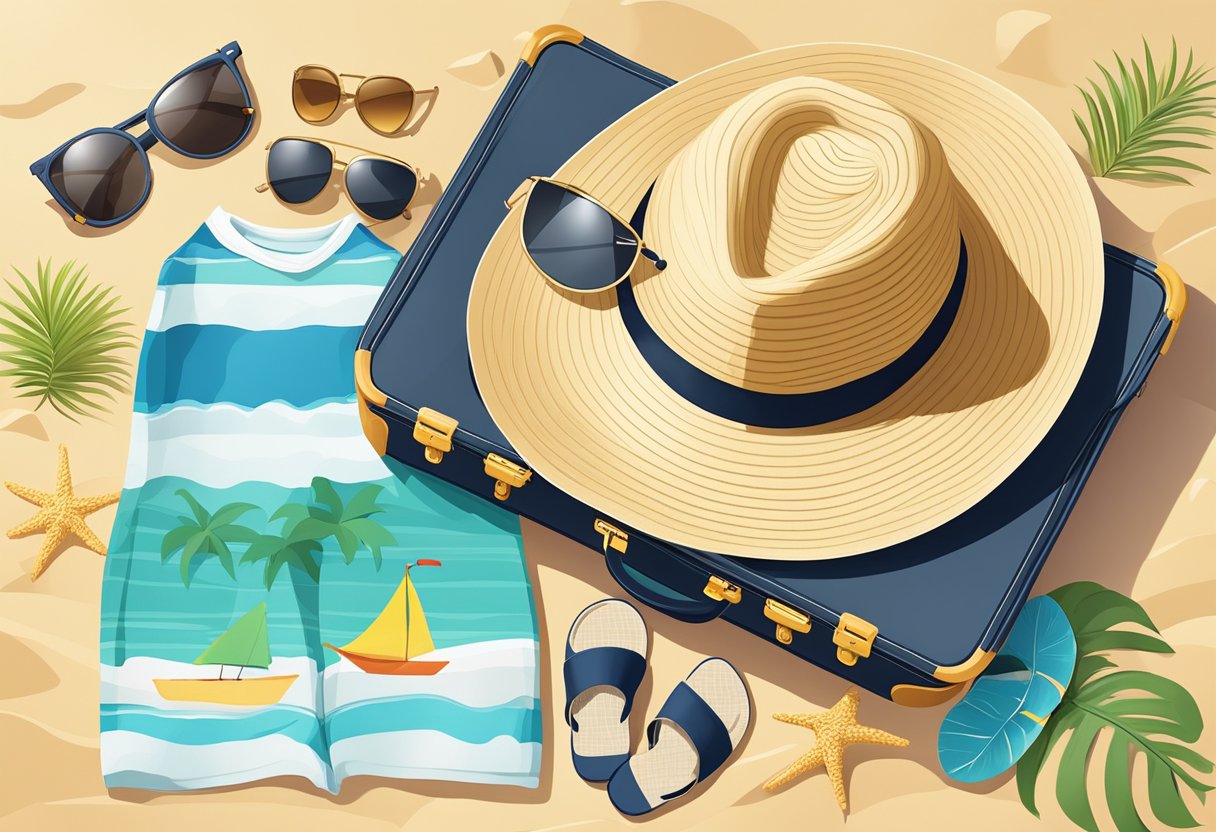
When packing for Fiji, it’s essential to consider the tropical climate—expect warm and humid conditions year-round. Your clothing and footwear should cater to this setting to ensure comfort during your holiday.
Daywear Essentials
For your daytime adventures in Fiji, you’ll need light and breathable fabrics. Consider packing the following:
- T-Shirts and Tank Tops: Opt for materials that wick away moisture.
- Shorts and Skirts: Quick-dry materials are a good choice.
- Swimwear: Bring at least two Swimsuits for frequent dips in the ocean or pool.
- Sarong or Sulu: Versatile for beachwear or visiting local villages.
- Hat and Sunglasses: Protect yourself from the sun with a wide-brimmed Sunhat and UV-protection Sunglasses.
Remember to include Sunscreen to shield your skin from strong UV rays.
Evening and Resort Wear
Evenings in Fiji can be casual or formal, depending on where you’re staying:
- Dress or Skirt: A breezy maxi dress or skirt for a comfortable yet elegant look.
- Shorts and a Lightweight Shirt: Ideal for a relaxed dinner by the beach.
- Cardigan or Light Jacket: Useful for cooler evenings or if you’re dining in high-end resorts.
Accessorise with a light Scarf or Shawl for a touch of style.
Footwear for Different Activities
Your activities in Fiji will dictate the kind of footwear you bring:
- Sandals or Flip Flops: Perfect for the beach and casual outings.
- Reef Shoes or Water Shoes: Protect your feet during water activities and when exploring coral reefs.
- Comfortable Walking Shoes: If you plan to explore beyond the beach, consider light hiking shoes or sturdy trainers.
By packing these items, you’ll be fully prepared to enjoy the stunning climate and beautiful landscapes of Fiji.
Beach and Water Activities Gear
When planning your beach and water activities in Fiji, it’s essential to pack the right gear to maximise your enjoyment and protect the marine environment. Ensure you have items suitable for the soft sands of the beach, the unique coral reef ecosystems, and water activities across Fiji’s numerous national parks and waterfalls.
Swimming and Sunbathing Items
- Beach Bag: Choose a sturdy, spacious beach bag to carry your essentials. Look for one that’s easy to clean the sand off and has compartments for wet swimwear.
- Sunscreen: Sun protection is critical. Pack a broad-spectrum sunscreen with a high SPF to protect your skin during swimming and sunbathing.
- Reef-Safe Sunscreen: Be mindful of the impact on the reefs and opt for a sunscreen that does not contain oxybenzone or octinoxate, which can harm coral.
- Swimming Shoes: Protect your feet from sharp coral or hot sand with a pair of snug-fitting swimming shoes.
- Water Bottle: Stay hydrated under the sun. Bring a reusable water bottle to keep your water intake up without contributing to plastic waste.
Snorkelling and Diving Equipment
- Snorkelling Gear: Pack your snorkel and mask to explore Fiji’s clear waters and vibrant coral habitats.
- Underwater Camera or GoPro: Document your underwater adventures with a waterproof camera or GoPro to capture the rich marine life up close.
- Scuba Diving: If you plan on scuba diving, consider hiring professional equipment from local dive shops to ensure safety and minimise luggage weight.
Health and Safety Items
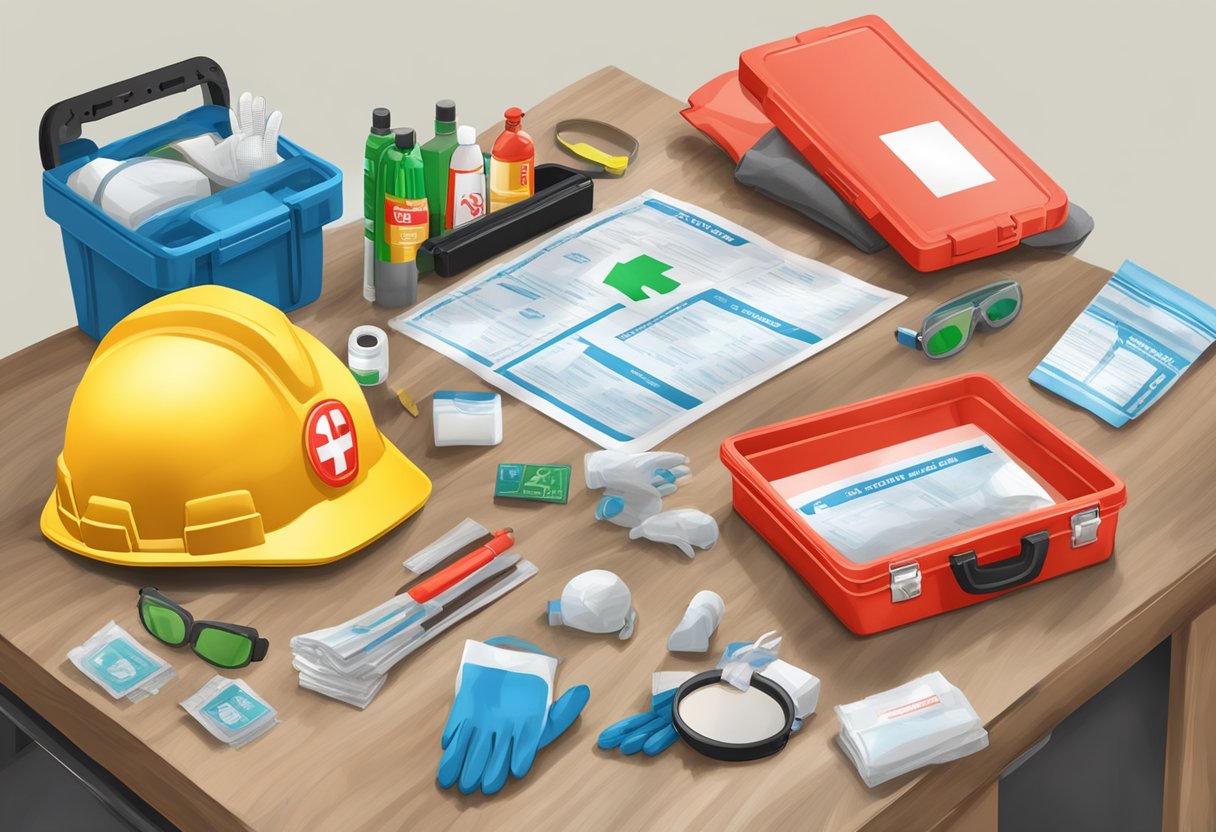
When travelling to Fiji, prioritising your health and safety is key. You’ll need to protect yourself from the sun’s intense rays and the ubiquitous mosquitos that can turn a holiday sour.
Sun Protection and First Aid
Your first line of defence should be a comprehensive First Aid Kit, tailored for tropical destinations. This should include Band-Aids for minor cuts and Paracetamol for pain relief or fever. Don’t forget a bottle of Sunscreen with high SPF to shield your skin from sunburn. Opt for a Reef-Safe Sunscreen to ensure your protection doesn’t harm Fiji’s delicate marine ecosystems. It’s advisable to choose a product that is Waterproof, especially if you plan on spending a lot of time in or near the water.
Insect Protection
To guard against Mosquito Bites, bring an effective Insect Repellent containing DEET or picaridin for long-lasting protection. A good practice is to reapply it throughout the day, especially in the early morning and late afternoon when mosquitos are most active. If you plan to spend evenings outside, consider packing lightweight long-sleeve clothing as an additional barrier against bites.
Electronics and Entertainment
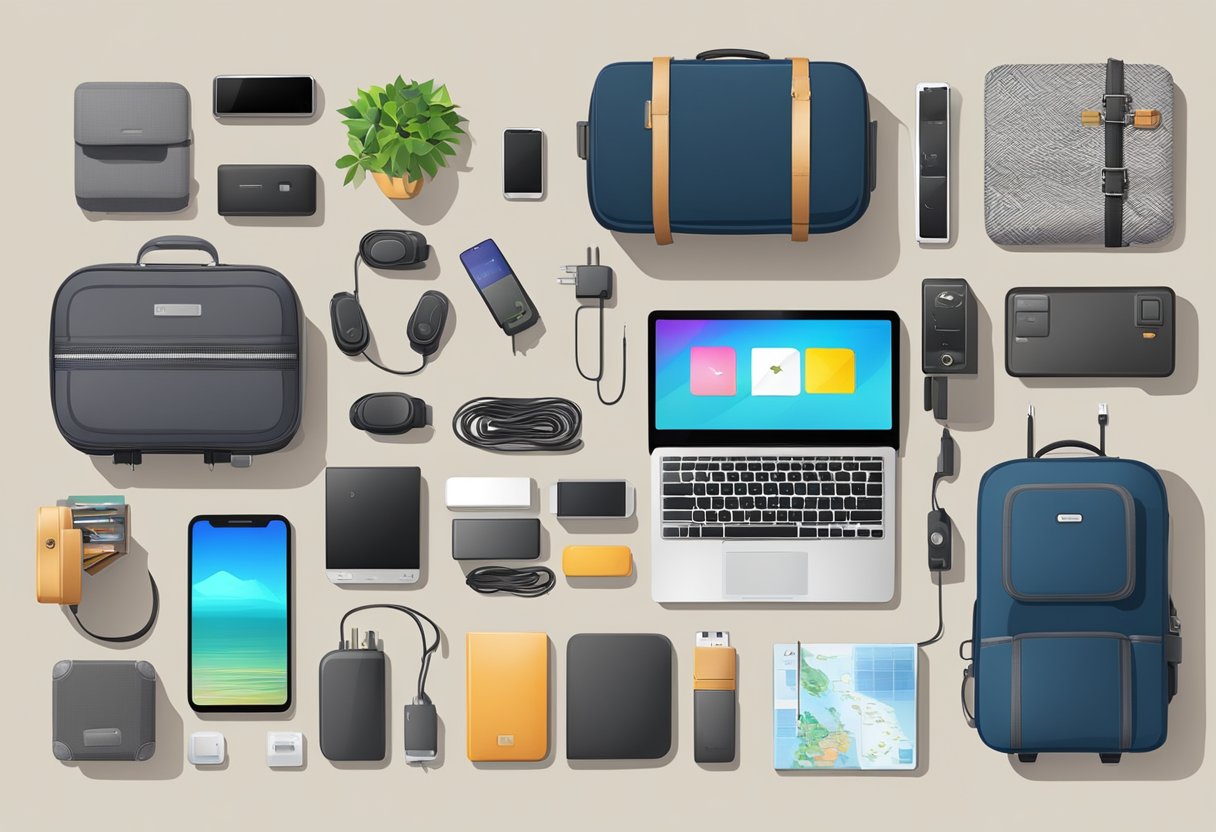
When travelling to Fiji, balancing your electronic needs with entertainment options is crucial for a pleasant trip. You’ll want to capture the stunning scenery, so a camera is essential. For adventure enthusiasts, a GoPro or an underwater camera with a wrist strap will enable you to document your experiences both on land and underwater. Remember, coral reefs and marine life make for some spectacular footage.
Ensure your devices stay charged with the appropriate chargers and consider bringing a portable power bank. If you plan to work or edit photos and videos, a laptop could be useful. Although, be mindful of weight and space.
Here is a quick checklist for your Fiji adventure:
- Camera: For capturing your trip’s highlights.
- GoPro/Underwater Camera: Ideal for snorkelling or diving.
- Wrist Strap: Secure your camera or GoPro, especially when around water.
- Charger(s): Don’t forget chargers for all your devices.
- Portable Power Bank: Handy for long days out.
- Laptop: For work or media editing (optional).
For your general electronics, it’s worth noting that Fiji’s power supply is 240 volts AC 50Hz, using the same three-point plugs as in Australia. Depending on where you’re travelling from, you might need an adapter. Pack accordingly and enjoy a seamless experience with your electronics and entertainment in Fiji.
Personal Care and Toiletries
When packing for Fiji, prioritising your personal care and toiletry items is essential to ensure you feel fresh and comfortable throughout your trip. Your personal care kit should be comprehensive but compact, considering the tropical climate and your personal needs.
Essentials:
- Toothpaste and toothbrush: Oral hygiene is a must, so pack travel-sized toothpaste and a toothbrush.
- Shampoo and conditioner: Miniature bottles are convenient, or consider solid bars to save space.
For Your Hair:
- Comb or brush: Keep your hair tangle-free after a day in the saltwater.
Laundry Needs:
- Travel-size laundry detergent: For quick washes, especially if you plan extended stays or have limited clothing.
Toiletry Items:
- Soap or body wash
- Shampoo and conditioner
- Toothbrush and toothpaste
- Deodorant
- Moisturiser, with sun protection if possible
- Comb or hairbrush
- Personal hygiene items tailored to your needs
First Aid Essentials:
Always bring a basic first aid kit to address minor cuts, scrapes, and other ailments. This kit might include:
- Plasters
- Antiseptic cream
- Pain relief medication like paracetamol
- Any personal medications
Insect Repellent:
- Mosquitoes can be prevalent, so packing an effective insect repellent is critical to prevent bites.
Remember, liquid items must comply with airline regulations, usually not exceeding 100ml per container. Solid toiletries can be a great alternative to navigate these restrictions while ensuring you have everything you need for personal care during your time in Fiji.
Cultural Considerations and Local Experiences

When packing for Fiji, it’s essential to consider the local culture and customs, particularly regarding dress code and etiquette, as well as the experiences at local villages and attractions.
Dress Code and Etiquette
In Fiji, dressing modestly is appreciated, especially when you are visiting villages or participating in local customs. A sarong or sulu, which is a type of wraparound skirt, is a versatile garment that can be worn by all genders. It’s perfect for occasions where respectful attire is essential. When engaging in adventures like visiting sacred sites, it is important to bear in mind that shoulders and knees should typically be covered. Always remember to remove your hat and sunglasses as a sign of respect when entering a village.
Visiting Local Villages and Attractions
Your journey to Fijian villages is not just an adventure; it’s an opportunity to immerse yourself in the authentic Fijian way of life. Before entering a local village, it’s courteous to present a small gift, known as a sevusevu, usually kava root, to the village chief. This gesture of respect can facilitate a warmer welcome. While exploring, embrace local traditions and join in communal activities, but ensure you follow the guidance of your host or a local guide, who will inform you of specific customs in each village.
Footwear and Accessories for Various Terrain
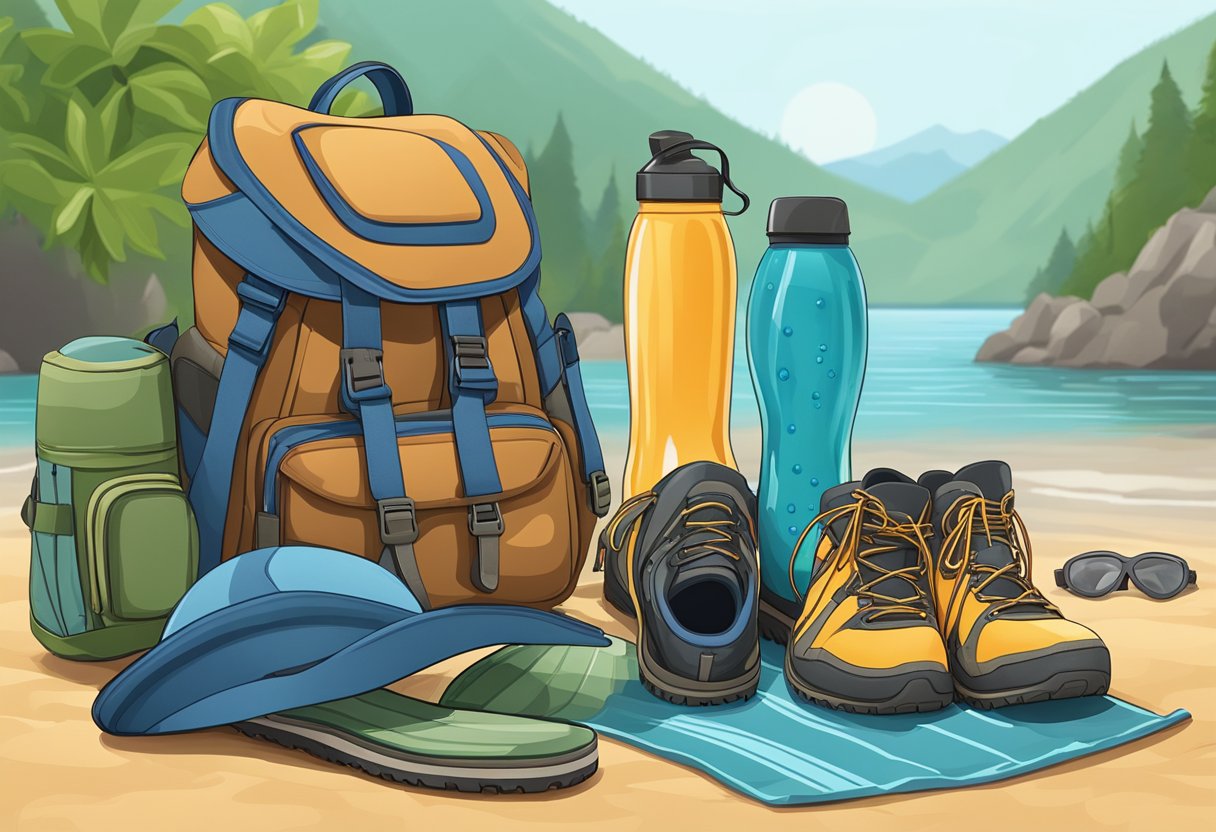
When packing for Fiji, choosing the right footwear is crucial as it can greatly influence your comfort and safety while exploring the diverse terrains of the islands. Whether you’re planning to hike through the lush rainforests or spend time in the water, each activity requires suitable shoes and accessories.
Hiking and Exploration
For your trekking adventures, especially if you’re aiming to conquer the trails in Fiji’s national parks, walking shoes that are durable and offer good traction are a must. These should be supportive, stable, and designed for walking long distances. The varying hiking trails may range from easy walks to more challenging treks, so consider hiking shoes with ankle support for added protection. Remember that during the wet season, trails can be slippery; shoes with a waterproof membrane and a robust grip can be incredibly beneficial.
- Essential Footwear:
- Hiking shoes/boots
- Waterproof socks
Water-Based Adventures
When participating in water activities or exploring beaches and reefs, reef shoes are invaluable. They will protect your feet from sharp corals and rocks while providing the necessary grip on slippery surfaces. Flip-flops or sandals made from water-resistant and quick-drying materials are perfect for casual beach outings. Opt for inexpensive and foldable options that are easy to pack and won’t feel like a loss if left behind or damaged.
- Recommended Footwear:
- Reef shoes
- Flip-flops or sandals
In conclusion, packing suitable footwear for the various terrains you’ll encounter in Fiji will enhance your overall experience, ensuring both safety and enjoyment.
Preparing for Fiji’s Weather Variations
When you’re heading to Fiji, it’s crucial to pack appropriately for the range of weather conditions you might encounter. Knowing what to bring will ensure you stay comfortable whether you’re caught in a tropical shower or enjoying a balmy evening.
Protective Gear for the Wet Season
During the wet season, which typically spans from November to April, you’re likely to experience Fiji’s heavier rainfall. Your luggage should include a durable umbrella or a waterproof jacket to keep you dry during these periods. A small umbrella can be easily carried in your day pack for unexpected downpours.
Light Layers for Cooler Evenings
As the sun sets, even tropical climates like Fiji’s can have cooler temperatures, especially if you’re staying near the water or in the highlands. Packing a cardigan or a light jacket will protect you from the evening chill. Choose breathable materials such as cotton to stay comfortable while enjoying Fiji’s night-time ambience.
Extras and Miscellaneous Items
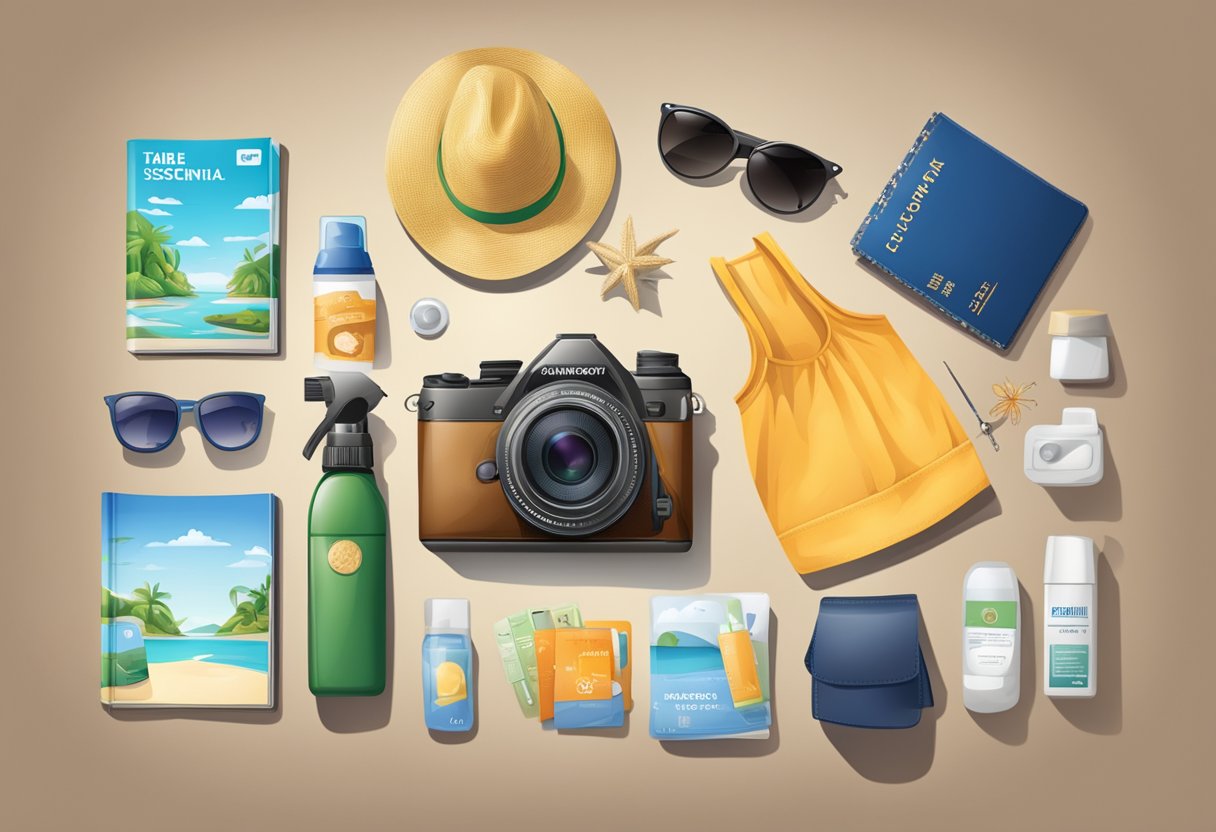
When heading to Fiji, aside from your essentials, consider packing extra items tailored for children’s needs and practical gadgets that enhance convenience on your trip.
Kids and Family Specific Needs
For your little ones, pack kids’ books that are both educational and entertaining for those moments of downtime. Include snacks that are not only favourites but also nutritious to keep everyone energised during excursions. It’s beneficial to have a water bottle for each child, preferably one that’s sturdy, leak-proof, and easy to carry.
- Kids’ Books: Choose lightweight and foldable options for easy packing.
- Snacks: Opt for non-perishable and inexpensive options to save money.
- Water Bottles: Ensure they’re stable and durable to withstand playful adventures.
Practical Items for Convenience
You’ll find that some practical items can significantly add to your comfort during your stay in Fiji. A foldable water bottle can save space in your luggage and ensure you stay hydrated in the tropical heat. Always carry a few inexpensive yet essential items such as a mini first-aid kit or a portable fan that could prove invaluable in unexpected situations.
- Foldable Water Bottle: Choose one that’s easy to refill and made of safe materials.
- Inexpensive Essentials: Mini torches, battery packs, or reusable shopping bags fit this category.
Post-Packing Checklist and Final Preparations
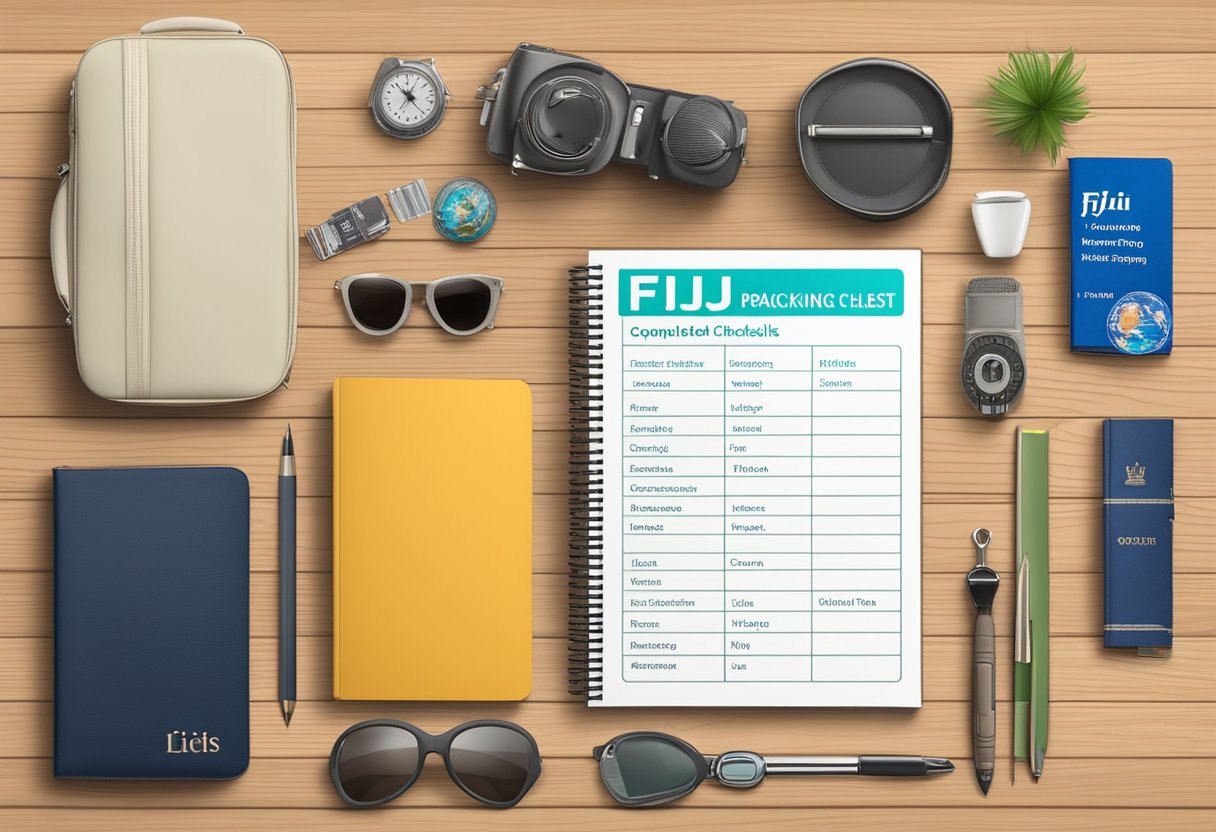
Before you set off to the sunny climes of Fiji, run through your post-packing checklist to ensure nothing essential has been left behind. Carefully review your packing to make sure you have all necessary items for a seamless Fijian getaway.
Essentials
- Passport: Your passport is your ticket overseas; check its expiry date is well beyond your return date.
- Visa Documents: Some travellers require a visa; verify you’ve got the necessary paperwork.
- Tickets and Accommodation Confirmations: Print or have digital copies accessible on your phone.
Money Matters
- Cash and Cards: Ensure you have some Fijian Dollars for immediate expenses and confirm your bank cards are travel-ready.
Luggage
- Suitcase: Confirm that your suitcase is within airline weight limits to avoid extra fees.
- Customs Regulations: Familiarise yourself with Fiji’s customs regulations to prevent any issues upon arrival.
Health and Safety
- Medication: Pack prescription drugs and a basic first aid kit.
- Toiletries: Sunscreen, insect repellent, and other personal hygiene items should be tucked in your suitcase.
- Travel Insurance: Double-check your policy and bring documentation.
Quick Checklist
- Chargers for electronics
- Emergency contact information
- House key storehouse
Iron out these final tidbits and you’ll be well-equipped for a fantastic time in Fiji. Remember, a comprehensive Fiji packing list can streamline your preparation process and set a confident tone for your travels. Enjoy your trip!
Frequently Asked Questions
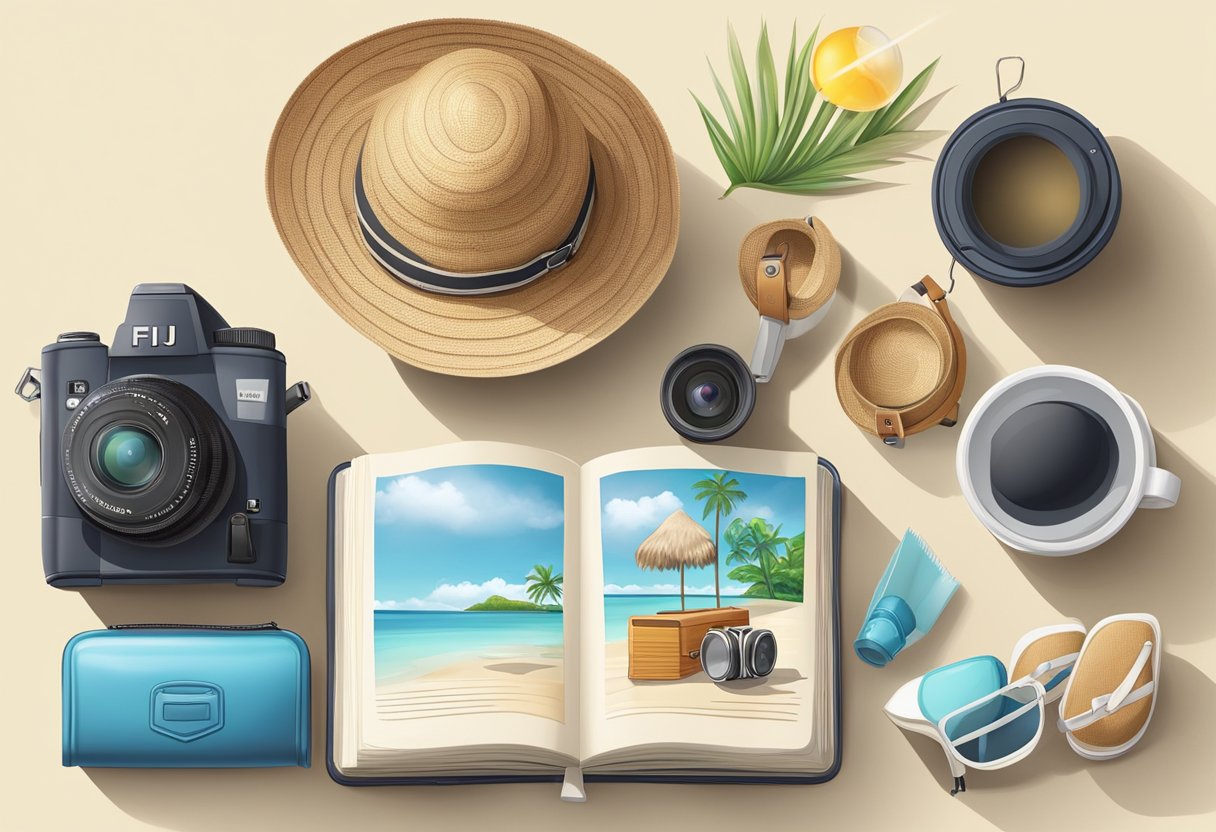
When packing for your trip to Fiji, it’s important to consider specific cultural norms, weather patterns, and activities you might engage in. Being well-prepared will enhance your experience and show respect for local customs.
What essential items should one bring when visiting Fijian villages?
Your visit to Fijian villages requires items that show respect for local customs. Consider bringing a modest garment like a sarong (sulu) to wear as a sign of respect, especially when participating in traditional ceremonies.
How should one prepare for a trip to Fiji with young children?
Ensuring a smooth Fiji trip with young children involves packing sun protection like hats and sunscreen, as well as beach toys and snorkelling gear for endless water fun. Always bring along any necessary medications and first-aid essentials.
What are appropriate clothing choices for Fiji’s climate in November?
Fiji’s climate in November is warm and occasionally wet, so pack lightweight and breathable clothing, including shorts and t-shirts, and a waterproof jacket for the occasional rainfall.
Which gifts are considered appropriate to bring for Fijian hosts?
When visiting Fijian hosts, a thoughtful gift is a contribution to the shared meal, known as sevusevu, usually kava roots. Otherwise, practical items that may not be readily available locally are well-received.
Is outerwear necessary for evening outings in Fiji?
Although Fiji’s evenings are usually mild, a light jacket or sweater is useful for the cooler nights of the dry season, or when you’re by the water.
What types of footwear are best suited for the Fijian terrain?
For most outdoor activities, durable sandals or water shoes are advisable for Fiji’s varied terrain. When hiking, closed-toe, comfortable shoes with good grip are essential to navigate the rugged landscapes.




